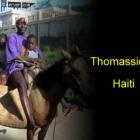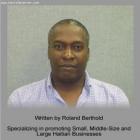Charcoal: Haiti's Dark Enemy
ADVERTISEMENT
For decades, we've been ecologically destructed our own habitat in the pursuit of financial stability without reminding the consequences of our mass destructively demolition. No mistake about it, deforestation brings lots of unexpected effects on our own Soil and results in many consequences.
Deforestation also leads to soil erosion, floods, climate change, health issues, ecological degradation, biodiversity, and wildlife extinction, and lastly community devastation to name a few. Even though, all of these actual facts are scientifically proven to be true, Haitians seem to be careless, selfish, and even ignorant about the problematics/consequences. Instead, they cut down massively the forestall trees to make Charcoal as the primary source of fuel consumption for cooking. Consequently, Haiti remains still one of the most deforested nations in the western hemisphere.
Charcoal making provides a considerable amount of employment in rural areas such as Duchiti, Beaumont, Randel and Port-a-Piment. These rural areas are mainly located around Haiti's one of the largest national forest park, which is Park Macaya. This barbaric business equally provides a great source of income for the locals and sufficiently stabilizes the mass exodus to the main cities, and lastly provides a decent financial opportunity for the thousands of locals that rely heavily on it. This lucrative business has been also sought and extensively progressed from illiterates' local intellectuals that ship the charcoal by bags to the Republic of Port-au-Prince due to higher sell price and a great margin of returns. Gradually, this becomes viewed as a regular entrepreneurial business idea for some. This market is undoubtedly one of the most sought after markets due to its constant increase profit without taxation.
Before Mathew hurricane, The Grand Sud of Haiti, used to produce monthly by itself between 30,000-40,000 bags of charcoal for house cooking services only. Forests used to cover nine tenths of the country: now only 1-2 percent remains densely forested. This region was the most densely forested of Haiti in spite of all the trees cut down.
Abruptly, hurricane Mathew has changed the game and has affected the producers and the consumers greatly. Now, the production has severely suffered and the demand has exponentially increased. Clearly, I can imagine what it's like for these people, just a new harsh reality. Most natural trees collapsed or damaged. Recently, I heard on the radio- a typical charcoal producer in the Grand Sud complained about the lack of production and his slow shipment of bags from 700 bags to 100 bags weekly.
What a Pity!
Now, this charcoal industry becomes obviously unsustainable and clearly detrimental on a host of things such as health related issues, agricultural, ecological, climate etc. There's no denying that this industry have been a major force economical in ensuring market stability to a certain extinct somewhat.
Reminisce, our last government was supposed to prioritize the environment and tackle the most devastating issues that have prolonged our nation but it talked the talk and never walked the walk. During this transitional period, we have failed miserably in all environmental aspects.
The Grand Sud Project, Scientific Advisor!
Bertrand_love@yahoo.com
Read more: Environment, Energy, Charcoal, Drought, Newsletter Articles, Energy Environment
« Haiti Alert: Cadmium within the Tarpaulins (PWELA) | Main | A call to boycott all fake Soup Joumou out there »
All Comments (2)
Hi
yhin we can help the people to use gaz oven instead of charcoal..let s start from
Sa fe lontan mwen pa jwen okin news soti bo kote nou.Sak pase?.Mwen toujou ap gade pou jwen news
Leave a Reply
Name (required) E-mail (required, will not be published)
» »
Our objective is to share with you news and information about Haiti and the people of Haiti. Traditions, habits and the way we were or grew are alive in this site. We highly recommend that you Subscribe to our Newsletter and also share with us some of the things that are memorable and made us unique people.


 Thomassique, Haiti
Thomassique, Haiti  Life After Death
Life After Death  Haitian Thanksgiving
Haitian Thanksgiving  Informative Marketing and Advertising in the Haitian Community
Informative Marketing and Advertising in the Haitian Community  Haiti tech Summit
Haiti tech Summit